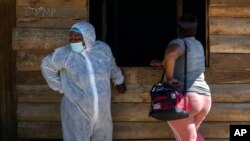As World AIDS Day is observed Thursday, the United Nations' AIDS agency warns that "dangerous inequalities" related to gender, high-risk populations and age have blunted AIDS response while COVID-19 remains the pandemic of global focus.
WASHINGTON —
Nations around the world mark World AIDS Day annually on Dec. 1 . This year, the Joint United Nations Program on HIV/AIDS (UNAIDS) is calling for increased efforts to combat disparities and "equalize" access to services and technology, especially on the African continent.
HIV disproportionately impacts young women in sub-Saharan Africa. Women and girls made up 49% of new HIV infections worldwide in 2021 and 63% of new HIV infections in sub-Saharan Africa, according to UNAIDS.
"To end AIDS, indeed to beat any pandemic, you need global solidarity to challenge and close the inequalities that drive a pandemic such as AIDS. We need to close the gender inequalities that are putting girls and women in Africa at very high risk," UNAIDS executive director Winnie Byanyima told VOA.
UNAIDS identified discrimination against key populations — gay men and other men who have sex with men, sex workers, transgender people, people who inject drugs and incarcerated people — as having deadly consequences and causing setbacks.
Children, who are acutely vulnerable, accounted for 15% of AIDS-related deaths worldwide in 2021, according to UNAIDS, but only 4% of all people living with HIV. The gap between adults and children who receive HIV treatment, or antiretroviral therapy, is also growing.
COVID-19 has been widely blamed for contributing to slowed progress in the global campaign to end AIDS.
The U.N. children's agency warned this week that "progress in HIV prevention and treatment for children, adolescents, and pregnant women has nearly flatlined over the past three years, with many regions still not at pre-COVID-19 service coverage."
“In Botswana, we still have around 7,100 new infections every year. This should be unacceptable, and it’s an area we need to focus [on] as we move forward," Alankar Malviya, Botswana's UNAIDS country director, told VOA, adding that COVID-19 "exposed how inequalities in our society enhances the vulnerabilities of sections of society."
The economic repercussions of the COVID-19 pandemic have also driven poor women in many countries, including South Africa, to transactional sex, increasing their risks of infection.
Despite the challenges ahead, the global community has made significant strides in the fight against AIDS over the last four decades including advances in treatment, access to services and prevention education.
“I think when you look at the number of new infections and you look at the number of deaths due to HIV, we have made incredible progress in the last 15 years," said Salim Abdool Karim, director of the Center for the AIDS Program of Research in South Africa, speaking on VOA's Straight Talk Africa program.
UNAIDS says $29 billion of funding is needed in 2025 to combat AIDS in low and middle-income countries and reach its goal of ending the public health threat by 2030.
Around 38.4 million people were living with HIV globally in 2021, and 1.5 million people were newly infected, according to UNAIDS.
VOA’s James Butty, Mqondisi Dube and Haydé Adams contributed to this report.




